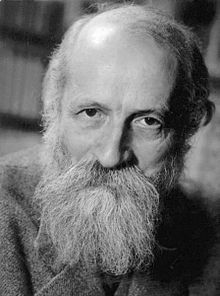Our website is made possible by displaying online advertisements to our visitors.
Please consider supporting us by disabling your ad blocker.
Martin Buber
Martin Buber | |
|---|---|
 | |
| Born | February 8, 1878 |
| Died | June 13, 1965 (aged 87) |
| Education | University of Vienna |
| Era | 20th-century philosophy |
| Region | Western philosophy |
| School | Continental philosophy Existentialism Neo-Hasidism |
Main interests | |
Notable ideas | Ich-Du (I–Thou) and Ich-Es (I–It) philosophy of dialogue |
| Signature | |
 | |
Martin Buber (Hebrew: מרטין בובר; German: Martin Buber, pronounced [ˈmaʁtiːn̩ ˈbuːbɐ] ; Yiddish: מארטין בובער; February 8, 1878 – June 13, 1965) was an Austrian-Israeli philosopher best known for his philosophy of dialogue, a form of existentialism centered on the distinction between the I–Thou relationship and the I–It relationship.[1] Born in Vienna, Buber came from a family of observant Jews, but broke with Jewish custom to pursue secular studies in philosophy. He produced writings about Zionism and worked with various bodies within the Zionist movement extensively over a nearly 50-year period spanning his time in Europe and the Near East. In 1923, Buber wrote his famous essay on existence, Ich und Du (later translated into English as I and Thou),[2] and in 1925 he began translating the Hebrew Bible into the German language.
He was nominated for the Nobel Prize in Literature ten times, and the Nobel Peace Prize seven times.[3]

- ^ "Island of Freedom - Martin Buber". Roberthsarkissian.com.
- ^ Cite error: The named reference
:0was invoked but never defined (see the help page). - ^ "Nomination Database". Nobelprize.org. Retrieved January 24, 2017.
Previous Page Next Page


